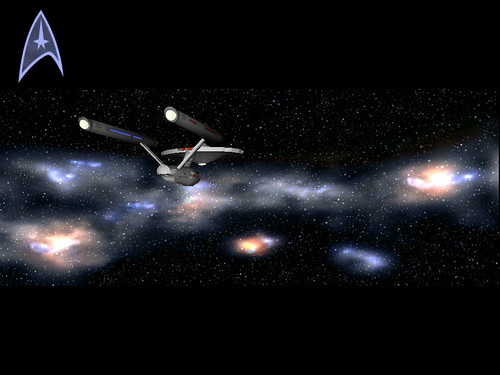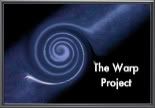TOS: The Second Pilot, a.k.a., Season One, Episode Three: Where No Man Has Gone Before
"Where No Man Has Gone Before" was filmed and aired as the pilot of Star Trek after NBC rejected the original pilot written by Roddenberry. Eventually, the episode was also aired as the third of the first season, once the original series began to run regularly. When NBC rejected Roddenberry's pilot, it turned to Samuel Peeples, an established writer of westerns, to construct the new pilot episode.
"The Cage" highlights psychological issues that Roddenberry hoped to explore with the series. While "Where No Man Has Gone Before" doesn't show itself as quite so intellectual as the Roddenberry pilot, Peeples's pilot still focuses on heavily psychological issues. "The Cage" offers clear moral lessons for its viewers, whereas the kind of psychological exploration to be seen in "No Man" is more about creating high drama. It appears less as a space drama than later Star Trek becomes in that it doesn't exhibit the unique factors that life in outer space would offer a series. Instead, this episode uses only the science fiction elements of mutation and extra sensory powers to its advantage, channeling them into the service of a highly dramatic hour long episode.
Episode Quick-Summary
Captain Kirk's crew intercepts a strange radio signal that turns out to be an old ship's recording device. They bring it on board so that Spock can listen to its records and analyze the information. Spock discovers that the device's ship was destroyed by its own captain for reasons associated with Extra Sensory powers (ESP). The Enterprise's resident psychiatrist, Dr. Dehner, knows a little bit about ESP, and, it turns out, tests high on such powers. Quickly, the ship encounters a strange anomaly, that they discover the previously destroyed ship had also encountered. Only two members of the crew are affected by the anomaly, however, Helmsman Mitchell (an old friend of Kirk's), and the Psychiatrist herself. The effects, we discover, are the stimulation of their own ESP to become even more powerful than before.
Episode Tidbits
Multi-level chess opens the episode, which is charming partially for how heavily it is featured later in The Next Generation (TNG). There, of course, we have no Spock, but Data instead, the character that would seem the natural expert in chess for his systematic intelligence. In this episode, however, we discover Kirk's intelligence, as he is beating Spock in play. Spock reminds us later in the episode that he feels nothing, he only knows logic (unlike later Spock that does exhibit controlled feelings). Kirk's humanity surpasses logic, it appears, by having the advantage of unplanned behavior that logic, apparently, wouldn't allow. For those of us familiar with TNG, we know that there too Data's systematic intelligence is not always enough to allow him to win the game. He can be caught off guard by unexpected moves suddenly taken by his human opponents. Intelligence, then, according to Star Trek, depends on more than mere logical reason. Spontaneity and risk are crucial elements as well.
In a comical moment (for us philosophers) Mitchell is found by Captain Kirk reading Spinoza, a 17th century Dutch philosopher. Mitchell disregards Spinoza, however, saying, "Once you get into him though, he's rather childish really. I don't agree with him at all."
In a reference to the 18th century German philosopher, Kant, Mitchell prepares to destroy Kirk by announcing, "Morals are for men, not gods."








No comments:
Post a Comment